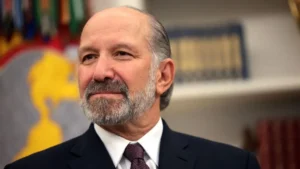In his final address to the nation, President Joe Biden delivered a stark warning about the growing influence of billionaires in American politics. He expressed concerns over the potential emergence of an “American oligarchy,” where a select few ultra-wealthy individuals wield disproportionate power over the nation’s democratic institutions. While Biden’s message resonated with many, it also triggered frustration among progressives, who argue that such issues should have been tackled earlier in his presidency.
Biden’s Warning: A Threat to Democracy?
During his speech, Biden highlighted how unchecked financial power, particularly from tech giants and corporate magnates, could pose a significant threat to democracy. He likened the situation to former President Dwight D. Eisenhower’s famous caution against the military-industrial complex, warning that a “tech-industrial complex” may now pose an even greater challenge.
“We must not allow our democracy to be hijacked by a handful of billionaires who prioritize their interests over the common good,” Biden stated in his address.
However, the timing of this warning has led to mixed reactions. Progressives argue that Biden’s administration should have taken stronger action against billionaire influence much earlier, citing regulatory inaction and the continuation of policies that benefited the wealthiest Americans.
Progressives’ Frustration and Calls for Action
Prominent progressive voices, such as Senator Sheldon Whitehouse and the Progressive Change Campaign Committee, expressed disappointment at the delayed acknowledgment of the issue. Many believe that tackling wealth concentration requires more than just rhetoric; it necessitates comprehensive policy reforms.
“We’ve been sounding the alarm for years,” remarked Adam Green, co-founder of the Progressive Change Campaign Committee. “Now is the time for real, actionable change.”
Billionaire Influence in Politics

The growing entanglement between wealth and politics has become more evident, with influential figures like Elon Musk, Jeff Bezos, and Mark Zuckerberg playing increasingly pivotal roles. Their financial contributions to political campaigns and policy-shaping organizations have raised concerns about their influence on governance.
Moreover, the Biden administration itself has faced scrutiny for its ties to high-profile donors, including individuals like George Soros and Ralph Lauren. Critics argue that such affiliations complicate efforts to curb billionaire influence effectively.
Looking Forward: What Comes Next?
As the nation transitions to new leadership, progressives are urging for systemic changes to ensure wealth does not dictate policy decisions. Proposals such as campaign finance reform, higher taxes on the ultra-wealthy, and stricter regulations on tech monopolies are gaining traction as potential solutions.
“If we don’t act now, the next generation will inherit an America where democracy exists only for the rich,” warned Senator Elizabeth Warren.
Conclusion
In conclusion, Biden’s farewell address has reignited critical discussions around billionaire influence in politics and the urgent need for reform. As the influence of billionaires continues to shape policies and impact democracy, it is essential for policymakers and citizens alike to push for meaningful change. Addressing the billionaire influence in politics requires a united effort, including stronger campaign finance laws, stricter regulations on lobbying, and greater transparency in political funding.
Now is the time to take action—whether by advocating for policy changes, staying informed, or supporting leaders committed to reducing the influence of billionaires in politics. The fight to preserve democracy is ongoing, and every effort counts. Stay engaged, share this message, and be part of the solution to ensure a more equitable and transparent political future. [USnewsSphere.com]





